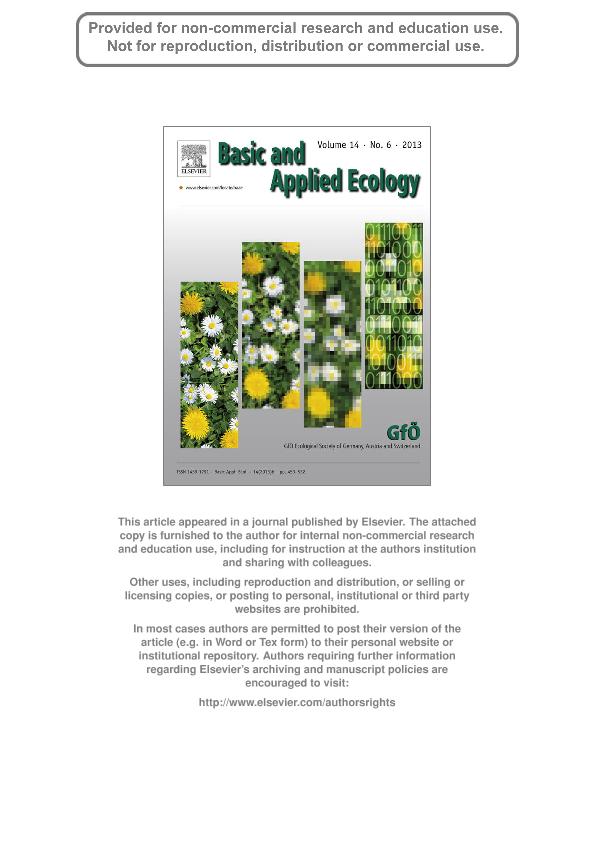Mostrar el registro sencillo del ítem
dc.contributor.author
Leonhardt, Sara Diana
dc.contributor.author
Gallai, Nicola
dc.contributor.author
Garibaldi, Lucas Alejandro

dc.contributor.author
Kuhlmann, Michael
dc.contributor.author
Klein, Alexandra Maria
dc.date.available
2017-06-07T19:12:38Z
dc.date.issued
2013-09
dc.identifier.citation
Leonhardt, Sara Diana; Gallai, Nicola; Garibaldi, Lucas Alejandro; Kuhlmann, Michael; Klein, Alexandra Maria; Economic gain, stability of pollination and bee diversity decrease from southern to northern Europe; Elsevier Gmbh; Basic And Applied Ecology; 14; 6; 9-2013; 461-471
dc.identifier.issn
1439-1791
dc.identifier.uri
http://hdl.handle.net/11336/17687
dc.description.abstract
Bees are in decline potentially leading to reduced pollination and hence production of insect-pollinated crops in many countries. It is however still unclear whether the consequences of pollinator shortages differ among countries with different environmental and societal conditions. Here, we calculated economic gains attributed to insect (particularly bee) pollination (EVIP) as well as their contribution to the total value of crop production (vulnerability), and analyzed their temporal trends and inter-annual variability from 1991 to 2009 for each country of the European Union (EU). To understand which factors drive country-specific differences in pollinator dependency and stability of insect-dependent crop yields, we further asked whether EVIP, vulnerability and stability of yields were influenced by a country’s climate, the number of wild bee species and/or managed honeybee hives per country, and (agricultural) gross domestic product (GDP). Across Europe, crop pollination by insects accounted for 14.6 [±3.3] billion EURannually (EVIP), which equaled 12 (±0.8)% of the total economic value of annual crop production. Gains strongly varied among countries. Both EVIP and vulnerability increased (and the inter-annual variation of vulnerability decreased) significantly from the colder northern to the warmer Mediterranean EU countries, in parallel with increases in the number of wild bee species. Across years, economic importance of pollination increased in all but three EU countries. Apples were the most important insect-pollinated crop in the EU, accounting for 16% of the EU’s total EVIP. Our results show that whereas dependency on insect pollination increased from the colder north to the warmer south, variation in economic gain from insect pollination decreased, indicating that Mediterranean countries had more stable yields of pollinator-dependent crops across years and thus more reliable gains from pollination services.
dc.description.abstract
Seit einigen Jahren nimmt die Bienendiversität in zahlreichen Ländern ab. Mögliche Folgen dieses Artenrückgangs sind eine Abnahme der Bestäubungsleistung und ein dadurch verringerter Ertrag bei insektenbestäubten Kulturpflanzen. Unklar ist, ob die Bedeutung der Bestäuberleistung und damit deren Auswirkung auf Ernteerträge mit den gesellschaftlichen und/oder Umweltbedingungen eines Landes zusammenhängen. In der hier vorgelegten Studie berechneten wir für die Länder der Europäischen Union (EU) den Wirtschaftsgewinn, welcher durch Bestäubungsleistungen (insbesondere von Bienen) erzielt wird (Wirtschaftswert der Insektenbestäubung, WWIB), sowie dessen Anteil am Gesamtgewinn aus dem Ertrag von allen Kulturpflanzen. Aus letzterem ergibt sich ein Wert, der dem landesspezifischen ,,Risiko” von Wirtschaftseinbußen durch einen Bestäuberrückgang entspricht. Darüber hinaus untersuchten wir jahreszeitliche Schwankungen von WWIB und dem Risikowert sowie deren Entwicklung über die Jahre 1991 bis 2001. Um besser zu verstehen, welche Faktoren landesspezifische Unterschiede in der Abhängigkeit von Bestäubungsleistungen sowie der Stabilität von Ernteerträgen bei insektenbestäubten Kulturpflanzen verursachen, analysierten wir die Zusammenhänge zwischen WWIB, Risiko und Etragsstabilität mit dem Klima, der Bienendiversität und Honigbienenvölkeranzahl jedes EU Landes sowie des Teils seines Bruttoinlandproduktes, der auf den Agrarsektor entfällt. Die Bestäubung von Kulturpflanzen durch Insekten machte innerhalb der gesamten EU jährlich 14.6 [±3.3] Milliarden EUR (WWIB) aus, was einem Anteil von 12 (±0.8)% des durchschnittlichen Jahesgesamtgewinns aus der Ernte von Kulturpflanzen entspricht. Die Gewinne waren von Land zu Land stark unterschiedlich. Sowohl WWIB als auch der Risikowert nahmen von den kälteren nördlichen Ländern zu den wärmeren Mittelmeerstaaten hin zu, ebenso wie die Bienendiversität, während jährliche Schwankungen des Risikowerts abnahmen. Die wirtschaftliche Bedeutung der Bestäubung nahm von 1991 bis 2001 in fast allen EU-Ländern zu. Äpfelmachten, als wichtigste in der EU produzierte Feldfrucht, 16% des aufBestäubungsleistungen basierenden Gesamtgewinns aus. Unsere Berechnungen verdeutlichen, dass sowohl die Abhängigkeit von der Insektenbestäubung als auch dieErtragsstabilität vomkalten europäischen Norden zu den Mittelmeerländern hin zunimmt. Mittelmeerstaaten erzielen folglich stabilere Gewinne aus insektenbestäubten Kulturpflanzen und damit aus Bestäubungsleistungen.
dc.format
application/pdf
dc.language.iso
eng
dc.publisher
Elsevier Gmbh

dc.rights
info:eu-repo/semantics/openAccess
dc.rights.uri
https://creativecommons.org/licenses/by-nc-nd/2.5/ar/
dc.subject
Climate
dc.subject
Crop Pollination
dc.subject
Ecosystem Service
dc.subject
Economiv Vulnerability
dc.subject
Honeybees
dc.subject
Stability
dc.subject
Wild Bees
dc.subject.classification
Ecología

dc.subject.classification
Ciencias Biológicas

dc.subject.classification
CIENCIAS NATURALES Y EXACTAS

dc.subject.classification
Otras Agricultura, Silvicultura y Pesca

dc.subject.classification
Agricultura, Silvicultura y Pesca

dc.subject.classification
CIENCIAS AGRÍCOLAS

dc.title
Economic gain, stability of pollination and bee diversity decrease from southern to northern Europe
dc.type
info:eu-repo/semantics/article
dc.type
info:ar-repo/semantics/artículo
dc.type
info:eu-repo/semantics/publishedVersion
dc.date.updated
2015-10-15T20:00:15Z
dc.journal.volume
14
dc.journal.number
6
dc.journal.pagination
461-471
dc.journal.pais
Alemania

dc.journal.ciudad
Berlin
dc.description.fil
Fil: Leonhardt, Sara Diana. Leuphana University of Lüneburg; Alemania
dc.description.fil
Fil: Gallai, Nicola. Ecole Nationale de Formation Agronomique; Francia
dc.description.fil
Fil: Garibaldi, Lucas Alejandro. Universidad Nacional de Rio Negro. Sede Andina; Argentina. Consejo Nacional de Investigaciones Científicas y Técnicas; Argentina
dc.description.fil
Fil: Kuhlmann, Michael. Natural History Museum; Reino Unido
dc.description.fil
Fil: Klein, Alexandra Maria. Leuphana University of Lüneburg; Alemania. University of Freiburg; Alemania
dc.journal.title
Basic And Applied Ecology

dc.relation.alternativeid
info:eu-repo/semantics/altIdentifier/doi/http://dx.doi.org/10.1016/j.baae.2013.06.003
dc.relation.alternativeid
info:eu-repo/semantics/altIdentifier/url/http://www.sciencedirect.com/science/article/pii/S1439179113000911
Archivos asociados
